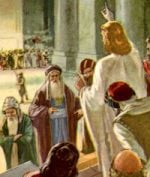Seven questions for cardinal-electors
By Phil Lawler ( bio - articles - email ) | May 05, 2025
Your Eminence,
In just a matter of hours, you will write down a name, and take a solemn oath that the man you have named is, in your judgment, the best choice to become the Successor to St. Peter. Before you fill out that ballot, please ask yourself:
- Why are you confident in this man? Because he is a good manager, or because he is a good man? Because he is clever, or because he is prayerful? Because he is a skillful diplomat, or because he is a loving pastor? Because he has good plans, or because he listens to the prompting of the Holy Spirit?
- If he is chosen by the conclave, what message will his election send to the world? Will it signal a “business as usual” attitude in Rome, or an interest in genuine reform? Will it inspire confidence in the countless Catholics (and others) who have been shaken by years of scandal? What message will it send to the millions of believers living under repressive regimes? Will it reassure them that the Vatican will not sacrifice principle for political convenience?
- Among your colleagues in the College of Cardinals, who else believes this man is the best choice? Is he a compromise candidate? Is this a time for compromise? Does he convey a sense of urgency about the work of the Church? Will he be content to preside over a continued decline of Catholicism in the West, or will he inspire a revival of faith and of missionary zeal?
- Has he proven successful in his own pastoral experiences? Is his reputation based on favorable publicity or on demonstrable results? Has the faith grown in the parishes and dioceses where he served? Does he even have any pastoral experience? Can he rally and guide the world’s bishops—can he fully understand their concerns—if he has never been a diocesan bishop himself?
- Will he unite or divide the universal Church? Will he comfort the many faithful Catholics who are now hurt, confused, and fearful about the future? Will he restore a sense of stability in teaching and respect for tradition? Is he more likely to take his cues from Church leaders in regions where the faith is growing (such as sub-Saharan Africa), or in regions where the faithful are leaving in droves (such as the German-speaking world)?
- Who will oppose him in this conclave? Who will likely oppose him if he becomes the Pontiff? Who has criticized him? Does he have enemies? If so, are they enemies of the Catholic faith as well? If he has no enemies, why not? In today’s world is it possible to proclaim the faith boldly without making enemies?
- Is he prayerful? Is it obvious? Does he, by his example, prompt others to pray? Does he love to celebrate Mass, to administer the sacraments? Does he have the tendency to turn an ordinary conversation toward spiritual themes? Would his leadership be more likely to prompt political campaigns or spiritual revivals? Would his papacy enrich your prayer life?
All comments are moderated. To lighten our editing burden, only current donors are allowed to Sound Off. If you are a current donor, log in to see the comment form; otherwise please support our work, and Sound Off!





